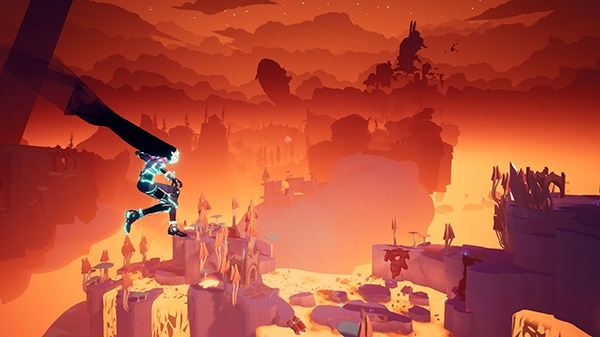.png?width=700&auto=webp&quality=80&disable=upscale)
Speaking at GDC 2023, HeartMachine narrative director and Solar Ash writer Tyler Hutchison shared sage wisdom such as "verb your characters" and "emotional outlines are bullshit."

HeartMachine narrative director and Solar Ash writer Tyler Hutchison took to the stage at GDC 2023 to hurl demonic pictures of Julia Roberts at devs in the audience (I know what I saw) and share pragmatic steps for creating functional narrative outlines that production teams will actually want to, y'know, read.
Hutchison says that story outlines should be a living document that effectively create a team's narrative production schedule. They need to be future proof and transferable, so that, as he puts it, "if you get hit by a bus, your story is still going to be the same."
Where story outlines are concerned, Hutchison says that the distribution of information is the biggest battle, and notes that a fictional outline will be the absolute best way to communicate and collaborate with your team.
Okay then, so what's the secret sauce that makes a good outline so damn delicious? It turns out the recipe contains a flavorsome combination of tips and tricks, and we've taken the liberty of highlighting some of them below. Roll the tape!
Use single sentence scenes
Hutchison says writers should get into the habits of writing their scenes and story beats like they are loglines. "Find the most concise and dense way to get all of your information into a beat," he explains.
"Put as much thought and care into writing a longline as you would into making your entire scene–you're writing this little one or two sentence thing fro people on your team so they can understand everything that's going on in your head."

Verb your characters (but not passively)
Hutchison says those writers after the "really easy formula" should simply verb their characters. "Get in, get out," he explains, pointing to a chain of quick-fire character verbs that tell us exactly what a character is doing such as "Joel crouched" or "Master Chief murders."
It's possible to do better, though. He suggests writers avoid the dangers of the passive voice, because "writing in the passive verb can hide complexities and abstract details that make it hard to estimate production costs." He uses the sentence "the player is learning more about who their father is" as an example of a passively verbed outline that could spiral, because it's impossible to estimate how many scenes that character beat would comprise in-game.
"Don't do it. Do something like this: 'the player learns Darth Vader is their father.' One scene. It's done. [...] If you see 'learn' or 'the player,' that should raise a red flag. Revisit it."

Pick your prose
This one really boils down to two words: be specific. Creating an outline is also an opportunity to be a writer, so lean into your lexicon and choose words that really sell a scene. As laid out by Hutchison, one example would be the difference between using the phrase "Master Chief kills Ronald McDonald" versus "Master Chief euthanises Ronald McDonald." They both describe the same action, but one paints a much richer (and undeniably darker) picture.

Connect your scenes (or the "SO/BUT" connection)
Hutchison adds that "so/but" is a really easy way to tie scenes together, and suggests that every single scene must start with either a "so" or a "but." Below is an example of the SO/BUT connection in action, featuring everybody's favourite plumbers:
"SO, Mario and Luigi perform acrobatics and throw turtle shells at each other on stage," says Hutchison. "That's what's happening right now. BUT, Mario hears a cry for help in a nearby castle. We see it. SO Mario runs jumps and glides through World One and arrives at the castle.
"BUT the king has been transformed into a dog. Oh no! SO Mario sneaks onto Larry Cooper's airship, BUT it's teeming with cannon balls and bullet bills. SO Mario dodges his way to the captain's cabin."
Hutchison notes the above is starting to look like an outline, and says writers can just keep plugging away at this pattern all day to create new narratives. "Just start saying SO and BUT," he implores. "Don't overthink it."

Emotional outlines are bullshit
Hutchison began this segment with an apology to anybody who used emotional outlines, but the man said what he said: they're bullshit. He says emotional outlines–that is, outlines that profess to chart all the emotional beats a character will experience–are dangerous, especially if you actually want your outline to be functional.
According to Hutchison, emotional outlines are hard to break down, and don't really convey how much cash it would take to realise a story moment (you've gotta keep an eye on those production costs, folks!). "If you just have a bunch of emotional beats that a charter is going to, but you don't know how they got there, how much work is hiding inside of that? It's impossible [to predict.] Just avoid it. Focus on events, avoid feelings."
It's also often more effective to describe actions and events that clearly imply a certain emotional state. As shown on the slide above, if you tell players "Sophie feels sad," they won't understand why. But if you explain that "Sophie has to choose which one of her children will live," they'll be clued in pretty fast.

Read more about:
FeaturesAbout the Author(s)
You May Also Like








